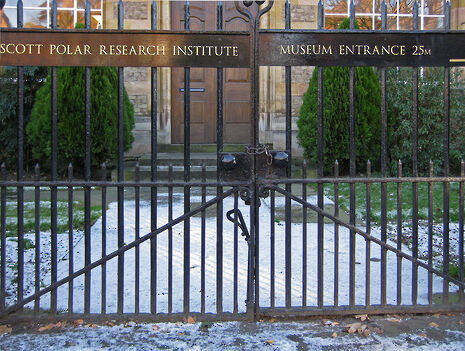Overlooked: Scott Polar Research Institute
Founded in Cambridge in 1920, the Scott Polar Research Institute was initially intended as a memorial to Captain Scott

“Polar exploration is at once the cleanest and most isolated way of having a bad time which has been devised,” wrote Apsley Cherry-Garrard in his memoir, The Worst Journey in the World. It charted his experience of Captain Robert Falcon Scott’s Terra Nova Expedition to Antarctica. The explorers set out in 1910 with two aims: meteorological, geological, geographical and zoological scientific research; and to be the first to reach the South Pole. The expedition’s most significant contribution to science was the discovery of fossils of the fern Glossopteris, which are also found in Australia, India, Africa and South America. This suggested Antarctica must once have been forested, and also helped to prove German geophysicist Alfred Wegener’s theory of continental drift. As for the second aim, however, Scott’s expedition failed. Roald Amundsen’s Norwegian team beat them to the Pole by 34 days. Scott’s party was hit by an ice blizzard on their return and, starved, exhausted and frostbitten, all five men died in March 1912.
I could not really fathom why anyone would voluntarily trek across the Antarctic until my first visit to the Scott Polar Research Institute, a centre for research into the polar regions. It boasts the world’s most comprehensive polar library and archives, offers a Master’s and a Doctoral Degree in Polar Studies, and its Polar Museum introduces the uninitiated to the history, culture and geography of the Arctic and Antarctic.
The North and South Poles? That’s nothing new, you might think. But did you know that the Arctic is actually an ocean with varying ice cover? That the small area of land above the Arctic Circle is treeless and covered in permafrost? That Antarctica’s surface ripples with mountains and active volcanoes? That it is the world’s largest desert, but there are lakes beneath its glaciers? That it was only discovered in 1820?
By the end of the 19th century, most of the Arctic coastlines had been mapped and charted, but Antarctica remained the earth’s last great terra incognita. Captain Scott, before his ill-fated Terra Nova Expedition at least, represented the golden years of the heroic age of exploration, when to set off into the dangerous unknown promised adventure, fame and fortune.
At the beginning of the 21st century, the importance of the Polar Research Institute lies in its environmental investigations. The cryosphere, which encompasses all of the ice on the earth’s surface, is one of the most dynamic components of the planet’s climate system. The better we understand the Arctic and Antarctic and the role they play in the delicate balance of our ecology, the more we will do to protect them.
 Interviews / You don’t need to peak at Cambridge, says Robin Harding31 December 2025
Interviews / You don’t need to peak at Cambridge, says Robin Harding31 December 2025 News / Unions protest handling of redundancies at Epidemiology Unit30 December 2025
News / Unions protest handling of redundancies at Epidemiology Unit30 December 2025 Comment / What happened to men at Cambridge?31 December 2025
Comment / What happened to men at Cambridge?31 December 2025 Features / ‘Treated like we’re incompetent’: ents officers on college micromanagement30 December 2025
Features / ‘Treated like we’re incompetent’: ents officers on college micromanagement30 December 2025 Theatre / We should be filming ADC productions31 December 2025
Theatre / We should be filming ADC productions31 December 2025








